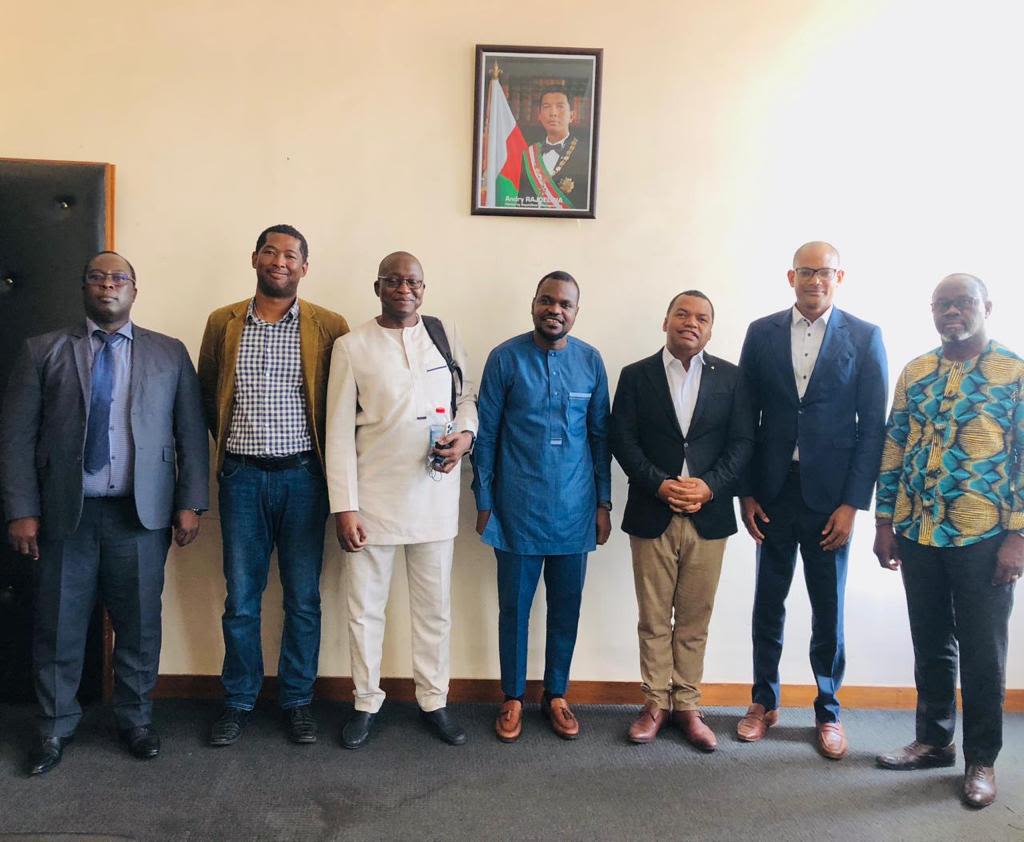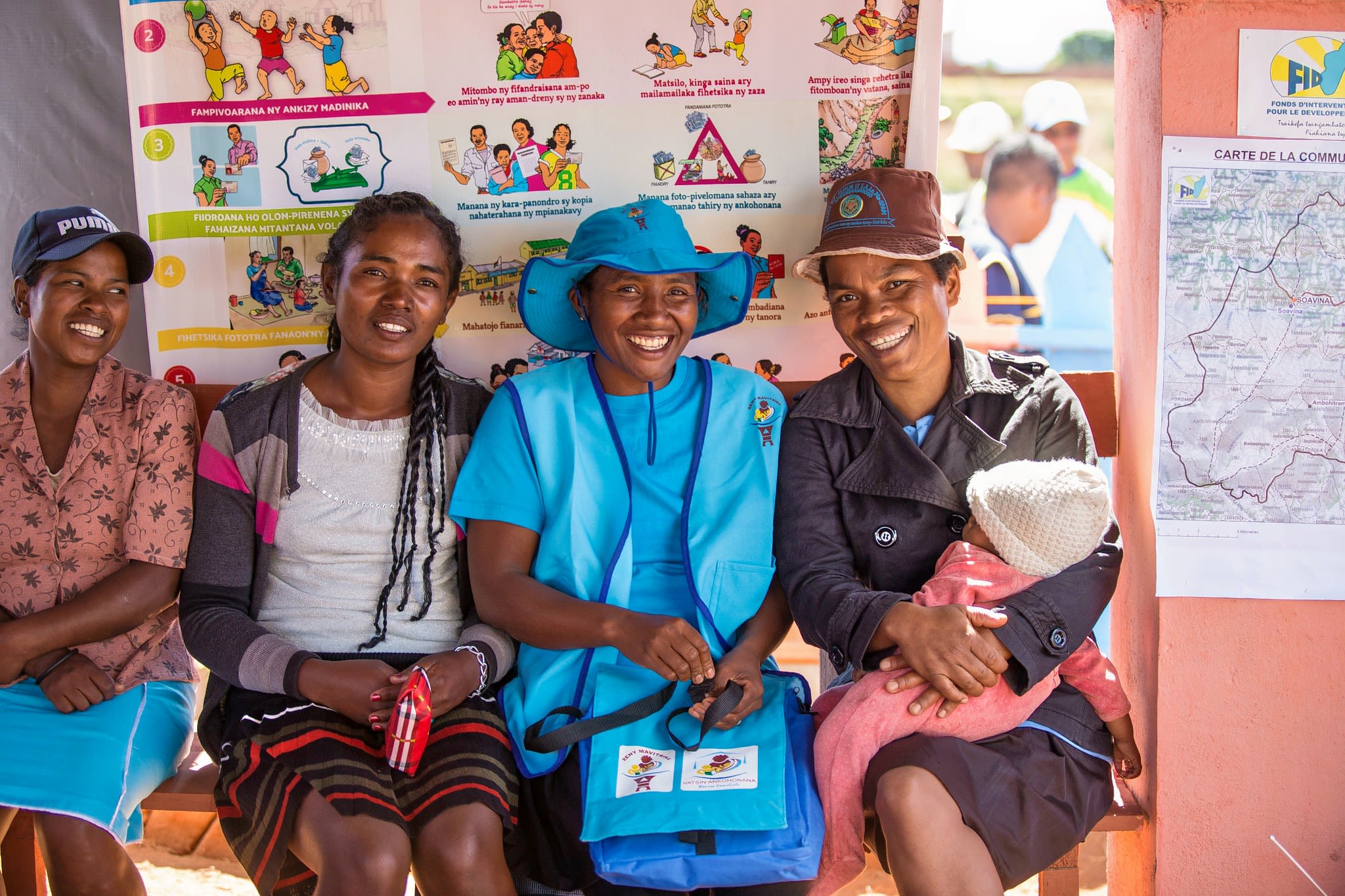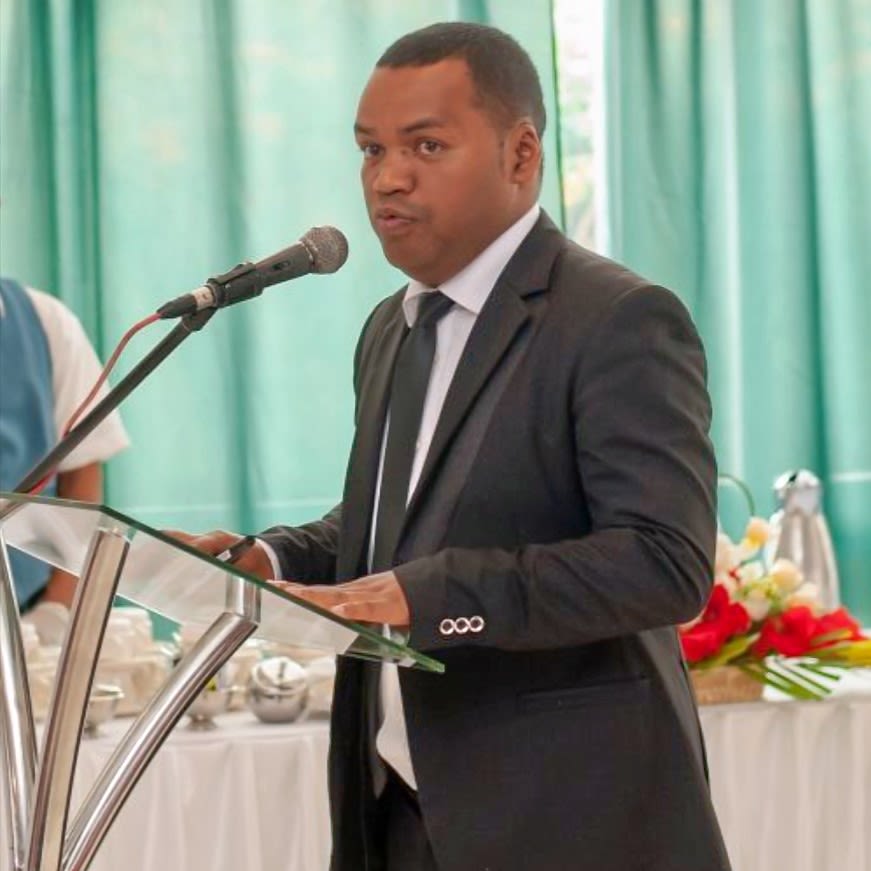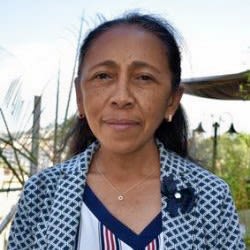MADAGASCAR
You Need Several Arms to Encircle a Baobab Tree: Madagascar Moving Forward on National M&E

Over two years of hard work, negotiation, patience and grit had culminated in this moment of progress. Madagascar government representatives, development partners and international donors sat together, discussing ways to support Madagascar’s plan to build their national monitoring and evaluation system – with each stakeholder offering support on a different element of the “Joint Roadmap.” It was a moment that really brought to life the African proverb, “you need several arms to encircle the baobab tree” – meaning that collaboration and coordination are necessary to achieve goals. It was also a moment that the Center for Learning on Evaluation and Results for Francophone Africa (CLEAR-FA), an Implementing Partner of the Global Evaluation Initiative (GEI), had brought to fruition by building trust, nurturing relationships and navigating a complex political context.
Throughout all its work in Madagascar and other countries, CLEAR-FA focuses on reducing fragmentation, catalyzing collaboration, and building partnerships – all fundamental to GEI’s systems-based approach to strengthening national monitoring and evaluation systems in developing countries. Not only are partnerships and collaboration important because building an M&E system is an enormous task that requires substantial resources, but because many stakeholders participate in and influence that system. Increasing collaboration also decreases information silos and helps integrate different perspectives – and is especially important in a cultural context where interpersonal relationships are crucial for building trust and moving forward.
Since 2020, Madagascar has made considerable progress in transforming its national M&E system from one primarily focused on donor-oriented monitoring and evaluation to a more organized, country-owned system, where evaluations are getting aligned with national priorities, despite some remaining political and technical hindrances.

CLEAR-FA delegation stands with the Coordinator of the Program of Reforms for the Efficiency of the Administration of Madagascar (PREA) and his team, after a meeting to inquire about CLEAR FA's expertise and to share their experiences for closer collaboration.
CLEAR-FA delegation stands with the Coordinator of the Program of Reforms for the Efficiency of the Administration of Madagascar (PREA) and his team, after a meeting to inquire about CLEAR FA's expertise and to share their experiences for closer collaboration.
Madagascar: A History of National M&E System Ups and Downs
The Republic of Madagascar is a semi-presidential democratic republic with a popularly elected president, a prime minister, a council of ministers, and a bicameral parliament. The President, the Prime Minister and the Council of Ministers constitute the Madagascar Government. The Parliament consists of two chambers, the Senate and the National Assembly.
In 2008, the Madagascar Government created, within the Ministry of Economy and Finance, the National Integrated System for Monitoring and Evaluation (SNISE) and established the National Statistics Development Strategy. The Government also put in place a directorate in charge of monitoring and evaluation. Despite these efforts, the Government did not undertake any evaluations, the monitoring system was barely functional, and reporting was scarce. Additionally, the SNISE was only used within the Ministry of Economy and Finance, leaving other branches of the Government with a poor M&E and reporting system.
In 2010, the newly adopted Constitution of the Republic of Madagascar stipulated that the Parliament was to oversee the evaluation of public policies, with the Court of Auditors providing technical support. In the following year, the Parliament set up a commission for the evaluation of public policies and launched the process of developing a guide for the evaluation of public policies.
This situation, in which responsibilities for evaluation were to be shared among various institutions, without clearly defined responsibilities or modalities to collaborate, led the Government to seek the support of UNICEF, UNDP, and the Center for Learning on Evaluation and Results for Anglophone Africa (CLEAR-AA) to develop a participatory and inclusive national evaluation system.
The objectives of the requested support were to create a system capable of aligning evaluation with national development priorities and to change the evaluation paradigm from one characterized by punishment, resistance, and denial, to an approach that promoted learning and continuous improvement. The question of who would host the coordinating agency for the newly-reinvigorated national system – the Government or the Parliament – created a sensitive situation requiring a creative resolution.

CLEAR-FA: Supporting Progress in Madagascar
In November 2020, the Government of Madagascar, the Centers for Learning on Evaluation and Results for Francophone Africa (CLEAR-FA) and for Anglophone Africa (CLEAR-AA), UNICEF, and UNDP agreed to pool their resources to support building a new, whole-of-government national evaluation system.
CLEAR-FA began its support by finding a way for the two entities currently in charge of evaluation in Madagascar to communicate and collaborate by helping to set up the Steering and Technical Committees for the implementation of the national evaluation system agenda. The Steering Committee is co-chaired by the Secretary General of the Presidency and the Chairperson of the Commission in charge of the evaluation of public policies at the National Assembly, whereas the Technical Committee is led by the Ministry of the Economy and Finance. Both committees include representatives from the Presidency, the Parliament, MASSE (the Madagascar Voluntary Organization for Professional Evaluation - VOPE), the Ministry of Economy and Finance, CLEAR-FA, UNICEF, and UNDP. These Committees created an inclusive platform for the implementation of the national evaluation system agenda and helped to ease some of the existing rivalry around the hosting of the new M&E coordinating agency, allowing for activities to move forward.
Under the guidance of these Committees, CLEAR-FA and CLEAR-AA supported the country in undertaking GEI’s Monitoring and Evaluation Systems Analysis (MESA) diagnostic. During this process, ninety-seven individuals representing all key national monitoring and evaluation stakeholders were consulted.1 The report was validated by the Government, the Parliament, and the other consulted stakeholders, paving the way for the development of the national evaluation policy (PNEVal), for which CLEAR-FA provided technical assistance in 2021.
To develop the PNEVal, CLEAR-FA, with the support of CLEAR-AA, designed a participatory methodology and conducted four inclusive national workshops, in partnership with UNICEF and UNDP. The 159 participants of the workshops were gathered from the country’s 22 regions, the central and local government entities, Parliament, universities, civil society organizations, private sector as well as development partners. To strengthen the country’s ownership over the PNEVal structure and content, national experts and stakeholder group representatives were organized into small teams that each wrote a piece of the policy with the oversight and technical support of CLEAR-FA.
Although the PNEVal has not been approved yet, the policy development process and the MESA recommendations convinced the Committees of the importance of building an M&E culture in the country. The Committees requested CLEAR-FA’s support to train M&E focal points within state institutions, the private sector and civil society organizations. Two training workshops were held in 2021 for 70 individuals on “Public Policy Evaluation.” To ensure that the training workshops were inclusive, CLEAR-FA and UNICEF developed criteria to select participants for the training and consultation workshops that were sensitive to gender, age, year of experience, physical disability, and organizational affiliation. Some participants of these training workshops were involved in the first evaluation undertaken by the Court of Auditors.
1 This includes representatives of the line ministries, the Presidency, the prime minister cabinet, the civil society, MASSE, universities, Parliament, Court of Auditors, governors

“Developing Madagascar’s national evaluation policy confirms the Malagasy State’s clear desire to promote a culture of performance. During this process, the quality of the intervention of the CLEAR experts allowed us to bring all stakeholders to clarify the issues and challenges around evaluation within our country. A big step forward.” Hasina Rakotozafiarisoa, General Coordinator of the Reform Programme for Administrative Efficiency, Presidency of the Republic of Madagascar.
Public Advocacy on M&E
In addition, CLEAR-FA supported the country with knowledge-sharing activities. The first event that CLEAR-FA supported was a webinar organized at the Francophone International Forum for Evaluation (FIFE) in 2022. It brought together government officials from Gabon, Benin, and Madagascar to discuss their strategies for strengthening their national evaluation systems. Following this webinar, the panelists agreed to create a platform for a regular exchange of their challenges and innovation in improving evidence-based decision-making processes and CLEAR-FA was asked to continue supporting this platform of collaboration.
With the goal of helping to overcome the misunderstandings between the Government and the Parliament with regard to the national evaluation system – and to facilitate communication and trust-building among the stakeholders – CLEAR-FA organized a second event. This event brought together representatives of Madagascar’s national entities (Government, Parliament and MASSE) to discuss lessons learned from their recent work on the national evaluation system. Having the participants discuss challenges, share their views, and then agree on possible solutions was a valuable step toward building the trust and relationships necessary for moving forward together on work to improve the national evaluation system in Madagascar.
To further enable learning and knowledge exchange for Madagascar’s M&E stakeholders, CLEAR-FA facilitated an invitation for the president of the Parliament’s commission in charge of the evaluation of public policies to present at the 7th National Assembly of the African Parliamentarians Network for the Development Evaluation (APNODE) in Morocco. The president shared her country’s experience with building a national M&E system and was able to hear the experiences of other parliamentarians. In addition, the meeting created an opportunity for the development of a local chapter of the APNODE Network. The APNODE Network serves as a platform where members of parliaments share information, knowledge and experiences on evidence use. Recognizing that parliamentarians are but one among many players in national evaluation systems, APNODE strongly focuses on collaboration and partnerships.

Building a Road to Collaboration
In December 2022, CLEAR-FA held one-on-one consultation meetings to discuss next steps, with officials from the Ministry of Economy and Finance, the Presidency, the Court of Auditors, the University of Antananarivo, UNICEF, UNDP, the World Bank Country Office, and the United Nations Resident Coordinator.
These meetings led to the design of the 2023-2024 Joint Roadmap, approved unanimously by all participants during a workshop. The Roadmap includes objectives to be implemented over the next two years such as:
- Writing evaluation briefs to support policy planning and implementation.
- Building capacities of line ministries, other government entities, and the parliament on commissioning and using evaluation.
Strengthening organizational capacity of MASSE. - Supporting a university-level institution to develop education programs and research in the field of M&E to build a critical mass of evaluation professionals in Madagascar.
- Developing a repository of public policies.
- Improving the existing digital monitoring system by linking it with the planning, budgeting, and evaluation systems.
- Undertaking at least one evaluation on a national priority and providing the emerging evaluators trained during the previous two workshops with the opportunity to get involved in the evaluation process.
- Supporting national stakeholders to disseminate their experience through gLOCAL Evaluation Week 2023 and the 2023 FIFE.
This Joint Roadmap, which is being implemented under the oversight of the Technical Committee, improves coordination among all the stakeholders. For instance, in the framework of this Roadmap, UNICEF has committed to lead the development of the evaluation briefs and provide support to the University on developing education programs and research in the field of M&E. UNDP has committed to build the capacity of the Parliament. The United Nations Resident Coordinator, the MASSE, and the Ministry of Economy and Finance agreed to lead awareness and advocacy activities. The World Food Program, which recently joined the collaborative effort, agreed to support other individual capacity building activities. CLEAR-FA will continue to provide technical support. The Technical Committee agreed to meet on a regular basis to measure progress toward a sustainable national M&E system.
With a united group of development agencies, international donors, and CLEAR-FA by its side, Madagascar has taken important steps toward building a country-owned and country-focused national M&E system. This system can be used as a powerful compass for the future - guiding and targeting approaches, identifying problems early on, helping to course correct, and, ultimately, delivering better outcomes for the Malagasy people.

“The drafting of the Joint Roadmap provides us with an overall vision and a new perspective on our daily activities.”

“The General Policy of the State of Madagascar has resolutely turned towards the implementation of bold reforms and vigorous interventions for the emergence of Madagascar. For this, we need a national evaluation policy that clarifies the roles of each stakeholder and the modes of collaboration and coordination in producing evidence. CLEAR, UNICEF and UNDP have completed all activities related to the development of National Evaluation Policy (PNEval) in an efficient and professional manner. We appreciated the responsiveness, availability, and innovative ideas to improve ownership throughout the process. An ideal partnership and a very rich collaboration that allowed us to challenge our PNEval in a constructive and thoughtful way.“
Story by Maria Fyodorova